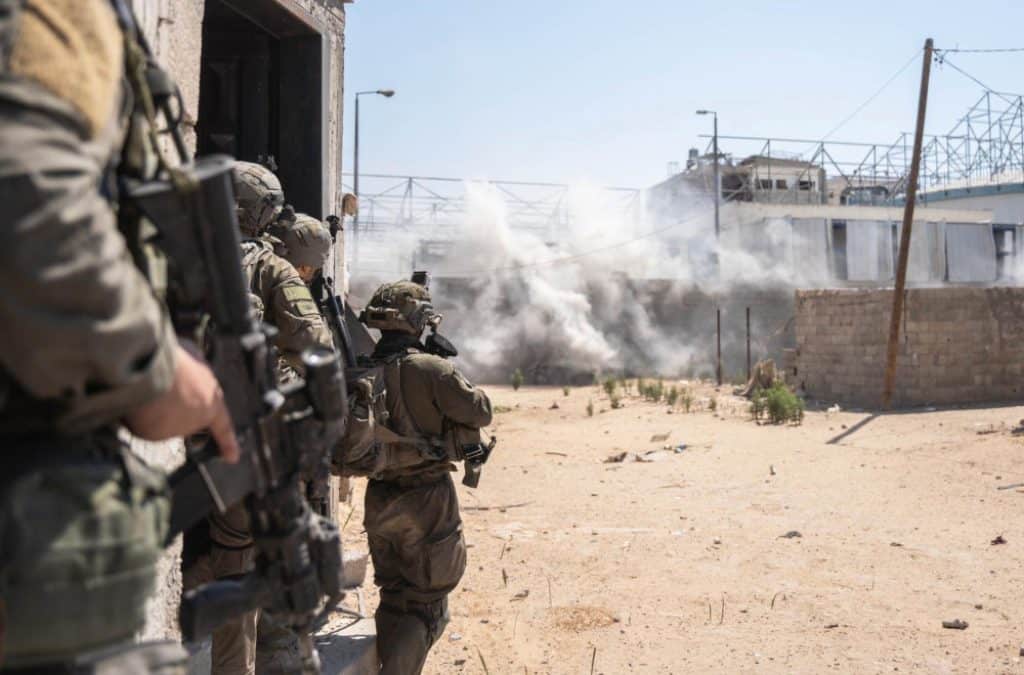
The Israel Defense Forces (IDF) entered the southern Gaza city of Khan Younis to target terrorists and uproot more terrorist infrastructure on July 22. The raid into Khan Younis is similar to raids into Jabalya and Shejaiya in northern Gaza, where the IDF’s 98th Division was sent into areas the IDF had cleared in the past. The raid comes as Hamas continued to fire rockets at Israel from Gaza and target Israeli forces in Rafah in southern Gaza.
The new operation began on July 22. The IDF called on civilians to evacuate parts of Khan Younis, including a portion of the humanitarian area in Gaza that covers Mawasi and some neighborhoods west of the city. “Due to significant terrorist activity and rocket fire toward the State of Israel from the eastern part of the Humanitarian Area in the Gaza Strip, remaining in this area has become dangerous,” the IDF said.
The IDF earmarked the humanitarian area as a location Gazan civilians could flee to throughout the war after Hamas’s attack on October 7, 2023. Hundreds of thousands of civilians have moved to the coastal area in southern Gaza. However, terrorists have also used the civilians for cover, firing rockets at Israel from the eastern part of this area. In addition, Palestinian commander Muhammad Deif and one of his brigade commanders met there in mid-July.
The IDF sent warnings to locals via messages, phone calls, and media broadcasts. While civilians were asked to evacuate, the hospitals were not evacuated. The IDF then struck more than 30 targets in Khan Younis and also carried out raids with the 98th Division, which has become experienced in these tactics through raids in northern Gaza between May and July. The 98th is also familiar with the landscape because it operated in the area before leaving in April.
Initial moves by Israeli forces in Khan Younis included strikes on “a weapons storage facility, observation posts, terror tunnel shafts, and structures used by the Hamas terrorist organization,” the IDF said. Further, overnight between July 22 and July 23, more than 50 more targets were struck by the Israeli Air Force. Footage distributed by the IDF showed tanks of the 7th Brigade preparing to enter Khan Younis, but it was unclear if they had already moved into the city. Photos showed Israeli commandos and paratroopers fighting in urban areas during the operation.
It is not clear how long the raid may continue. Khan Younis is the hometown of Hamas leader Yahya Sinwar and a number of his key lieutenants.
Meanwhile, in southern Gaza, Israel also operated in Rafah and along the Philadelphi Corridor, where forces have been fighting since early May. Recent operations included clashes in Tel al-Sultan west of Rafah, where the IDF said “dozens of terrorists” were eliminated. Hamas also suffered casualties in Rafah. However, Hamas also told the pro-Iranian media site Al-Mayadeen that it has carried out attacks on Israeli forces in Rafah and Tel al-Sultan that targeted tanks.
Among the units fighting in Rafah is the IDF’s Nahal Infantry Brigade. On July 23, the IDF said that the brigade had “eliminated over 150 terrorists who posed a threat to the troops and located approximately 400 different weapons” in the last two months of fighting. Overall, the Rafah operation has resulted in more than 900 terrorists eliminated since May, according to previous reports.
Nevertheless, challenges remain. Hamas continues to use refugee camps for cover, including the Yibna and Alshaboura Camps, the IDF said on July 23. The terrorists also used a school to threaten a humanitarian aid route. In another incident on July 22, rockets targeting Israel were fired from areas in central Gaza. Sirens sounded in several border communities, and artillery fire could be heard near the border, apparently responding to the rockets.
Hamas holds an estimated 120 hostages in Gaza. Israeli authorities concluded on July 22 that two hostages, Alex Dancyg and Yagev Buchshtab, were killed several months ago in Khan Younis. Dancyg was 76 years old and abducted from Kibbutz Nir Oz on October 7. Buchstab was 35 and kidnapped from Kibbutz Nirim. Buchstab’s wife, Rimon Kirsht-Buchshtab, was also kidnapped, but she was released during the first hostage deal with Hamas in late November.







